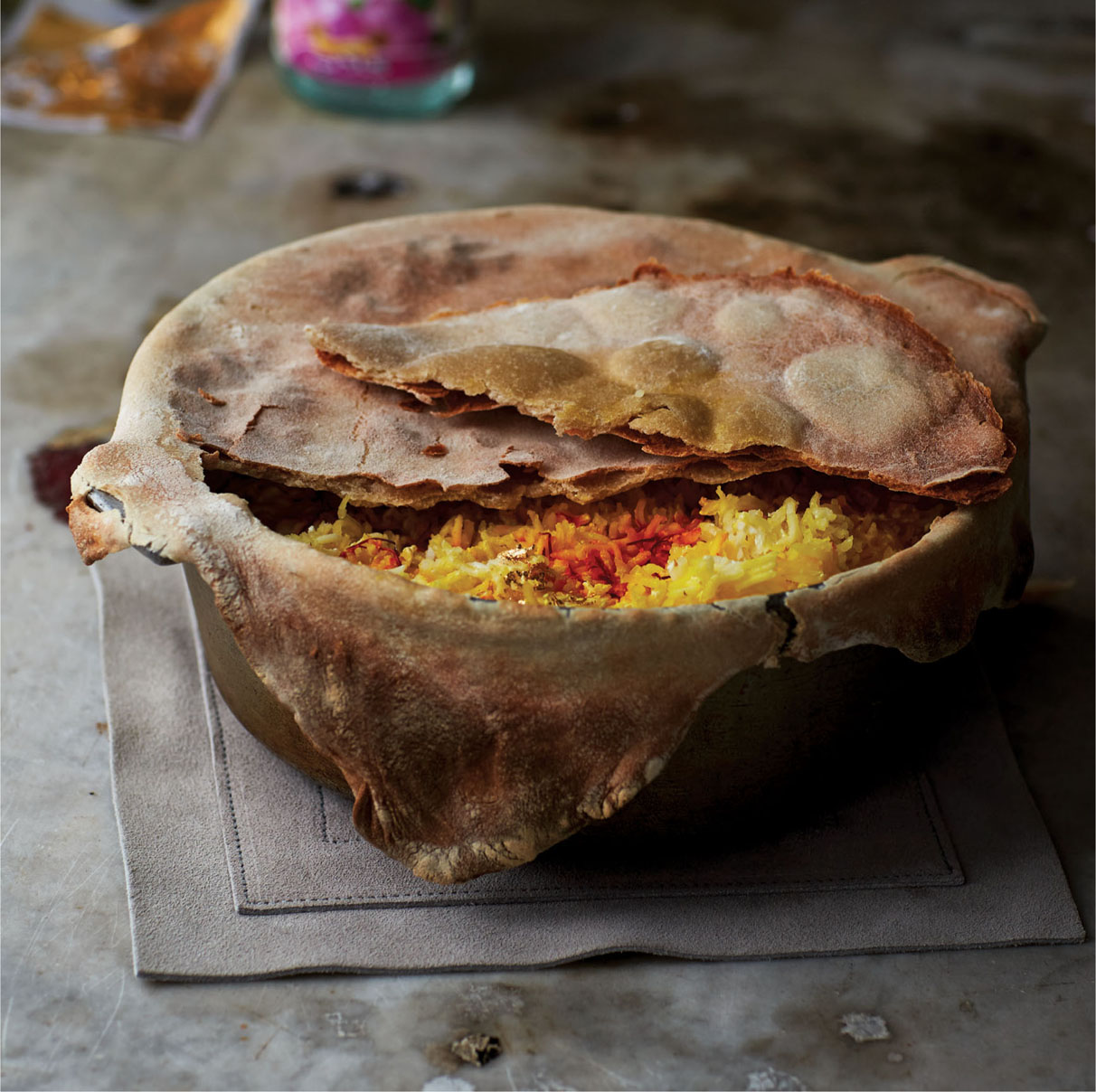DUMPUKHT BIRYANI
INDIA

Dumpukht in Lucknow or dumpokht in Hyderabad describes a way of slow-cooking in an airtight pot (handi), which can be earthenware or metal. The word comes from the Persian—dum meaning “breathe in” and pukht meaning “to cook.” The method is traditionally associated with the Awadh region of India, once ruled by the Muslim Nawabs with the origins of dumpukht assigned to the reign of Nawab Asaf Udd-Daulah, who ruled from 1748 to 1797.
I learned to make this biryani in the garden of Begum Mirza (Begum is a title given to noble-women deriving from the word Bey, the title given to noblemen) in Hyderabad, and even though the Begum was quite old and not so mobile, she had organized a perfect mise en place and was very precise and attentive to details as she proceeded through each step of the biryani. Begum Mirza used mutton, which means goat in India, saying it is the preferred meat there; but goat in India seems to be a lot more tender than goat in England or even America, so I am suggesting lamb. As I watched the Begum cover the raw marinated meat with the uncooked rice, I wondered how the meat was going to cook in the same time as the rice. She assured me it would, explaining that the green papaya she had added to the meat marinade was a natural tenderizer. The Begum also did something very interesting at the very end. She took a piece of charcoal and held it with tongs over the gas fire. When it started turning into a glowing ember, she put it in with the rice to give it a smoky flavor. I had never seen anything like it done before. She didn’t leave it for too long, just a few minutes to smoke the biryani. As she scooped the biryani out of the pot and onto the serving platter, I was surprised to see that both rice and meat had cooked perfectly. Then, when I started eating, I found the meat to be very tender and the rice wonderfully fragrant, having absorbed the flavors of the subtle marinade as well as the smoky flavor of the burning piece of charcoal. Perfectly exquisite.
SERVES 6 TO 8
FOR THE MARINATED MEAT
4 small onions (14 ounces/400 g total), grated on the fine side of a grater
1 tablespoon finely minced green papaya
Seeds from 2 black cardamom pods
1 tablespoon black peppercorns
1 teaspoon cumin seeds
6 whole cloves
Good pinch of saffron threads
2¼ pounds (1 kg) boneless lamb shoulder or leg, cut into medium chunks
Sea salt
2 cups (500 g) yogurt
FOR THE BIRYANI
2½ cups (500 g) long-grain rice, soaked for 15 minutes in lightly salted water
2 cups (500 g) yogurt
Sea salt
½ cup (125 g) ghee or unsalted butter, melted, plus 2 tablespoons (30 g), melted, for the rice
½ cup (125 ml) whole milk
1. To marinate the meat: Mix the onions, green papaya, and spices in a large bowl. Add the meat and season with salt to taste (see Note). Mix well. Add the yogurt, mix again, and let marinate for at least 2 hours, preferably longer.
2. To make the biryani: Drain and rinse the rice and put in a bowl. Add the yogurt, ⅔ cup water (160 ml), and salt to taste.
3. Put the marinated meat in the bottom of a large pot. Pour the ½ cup melted ghee over the meat. Add the rice and 1 cup (250 ml) water. Wrap the lid with a clean kitchen towel and place over the pot. Wrapping the lid stops the steam from the rice from falling back, which keeps the rice fluffy and the grains separate. Place the pot over medium-high heat and bring to a boil, for about 5 minutes. Reduce the heat to low and let simmer gently for 20 minutes.
4. Uncover the pan and sprinkle the 2 tablespoons melted ghee over the rice, along with the milk. Place the lid back over the pan and cook for another 15 minutes, or until the meat is completely tender and the rice has absorbed all the liquid and is tender and fluffy. Serve immediately.